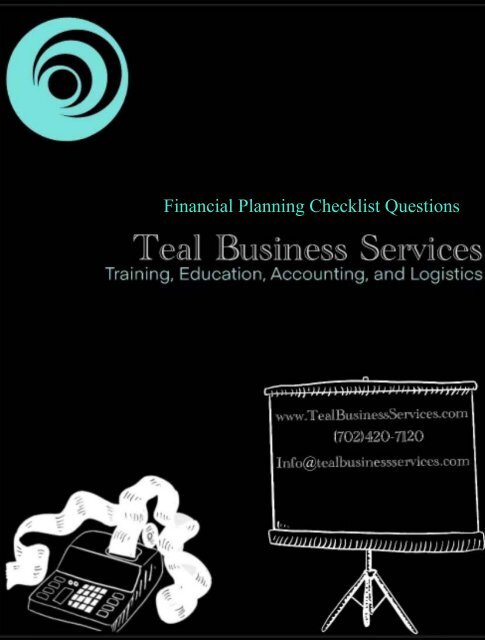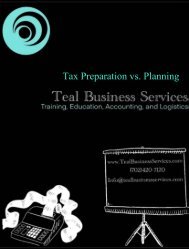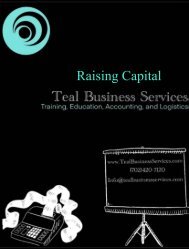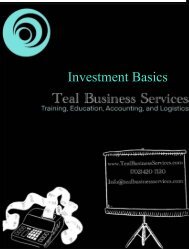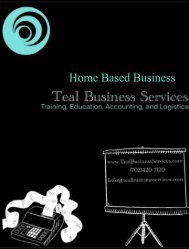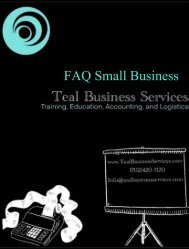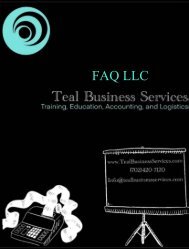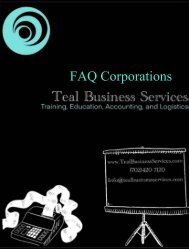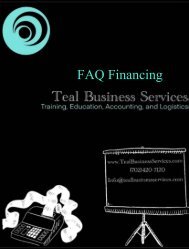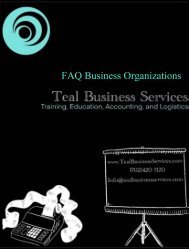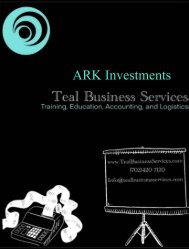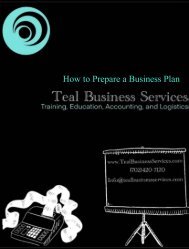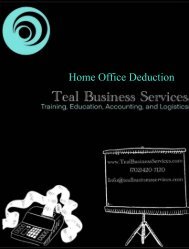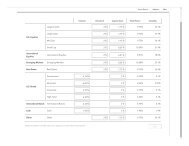Financial Planning Checklist Questions
You also want an ePaper? Increase the reach of your titles
YUMPU automatically turns print PDFs into web optimized ePapers that Google loves.
<strong>Financial</strong> <strong>Planning</strong> <strong>Checklist</strong> <strong>Questions</strong>
Once you've finished with your tax planning for the year, and your return is safely on its<br />
way to the IRS, you're at an excellent point for a quick financial check-up. Your tax<br />
return is handy, as a quick snapshot of your financial situation and the figures are recent<br />
and accurate. Take a few minutes to consider these questions:<br />
1. Have you determined your short- and long-term financial goals?<br />
Have you consistently reviewed and updated them for any changes?<br />
2. Are you saving and investing sufficient sums to fund your short- and long-term<br />
goals?<br />
By defining goals that are time and dollar specific, you can regularly assess if you are on<br />
track to reach them.<br />
3. Are you making the best use of tax-deferred savings plans, such as IRAs,<br />
401(k)s, and Keoghs?<br />
Are you contributing the maximum you can? Did you make plan investment choices<br />
consistent with your investment time frame and risk tolerance? Alternatively, are you<br />
satisfied that you have worked out the most appropriate way to take withdrawals for<br />
both yourself and your designated beneficiaries, with a careful balancing of income tax<br />
and estate tax considerations?<br />
4. If you are an employee, are you getting the optimum from your employee<br />
benefits?<br />
Do you understand and use any flexible spending accounts that you may be eligible for?<br />
Have you developed a strategy for exercising your employer stock options and using<br />
any deferred compensation plans?<br />
5. If you are concerned about paying for a child's education, are you saving and<br />
spending in the most appropriate ways?<br />
Are you using tax-deferred savings, tax-favored loans, and tax credits? Are you striking<br />
an appropriate balance between saving in the child's name (either outright or in trusts)<br />
and saving in your own accounts?<br />
6. Do you have an "emergency fund?"<br />
Many experts recommend that you have the equivalent of three to six month's takehome<br />
pay in an account where you can get at it quickly. An emergency fund gives you<br />
cash to weather a squall or two without having to disturb your investment portfolio or<br />
sell off any other assets.<br />
7. Have you checked the asset allocation of your portfolio lately?<br />
Run-ups and downturns in the market can each disrupt the allocation of your
investments, leaving you with more or less in any one asset class than you consider<br />
optimal. Should you be thinking about tax-free or taxable fixed income securities, based<br />
on your marginal tax rate and risk tolerance?<br />
8. Do you have adequate insurance?<br />
If you die unexpectedly do you have enough life insurance to protect your family? What<br />
about disability insurance if you or your spouse couldn't work for an extended period of<br />
time? Most people have auto insurance is required by law and most homeowners also<br />
are required to have adequate homeowner's insurance, but did you know that it's just as<br />
important to have insurance to protect the contents of your home even if you rent it?<br />
9. Do you have all of the necessary legal documents in place?<br />
Is your will up-to-date? How about your estate plan? Trusts for you and/or your spouse<br />
and other heirs? A living will or other health care directives? A durable power of<br />
attorney for managing your assets if you can't? Have you told family members or<br />
trusted friends where they can find these documents?<br />
10. Is your credit under good control?<br />
Is the interest rate on your mortgage the best you can do, or should you be applying for<br />
a lower rate? Should you be shopping for a credit card with a lower interest rate, or<br />
perhaps for a home equity loan?<br />
11. Are you maximizing your cash flow through income tax strategies?<br />
How are you funding charitable contributions -- with cash or securities? Do you prepay<br />
itemized deductions to accelerate the tax benefit?<br />
12. If you own your own business, do you have a plan for smoothly passing on that<br />
business to family members or trusted employees?<br />
Are you aware of and planning for any income and related estate taxes? Are you making<br />
optimum use of insurance to safeguard your transition plans?<br />
13. Have there been significant changes in your family this year?<br />
Births, deaths, graduations, engagements, and the beginning and ending of marriages<br />
can all have multifaceted effects on your financial plans. Consider their effect on your<br />
own situation. You may want to start a college fund for a new baby, or make a plan for<br />
investing assets you've inherited, or make provision for your daughter's wedding next<br />
summer. On the other hand, if you have recently divorced, you will want to review the<br />
beneficiary designations on your insurance policies and retirement plans.


